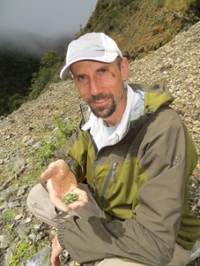Robin W. Warne
Professor

Research in the Warne Lab explores how animals maintain homeostasis in the face of ecological variation and disease dynamics. In amphibians, we explore how development, physiological performance, and disease are determined by gut microbiome interactions with host neuroendocrine function. We also test how these interactions scale up to impact ecological community processes such as consumer interactions, and disease outbreaks. Our question driven work includes research on amphibians, lizards, rodents, and insects. For this integrative work we use a diversity of tools that include stable isotope physiological ecology, endocrinology, evolutionary ecology modeling, and disease assays in both field and lab-based experiments.
Current projects include exploration of: (1) microbiome effects on development plasticity, physiological performance, and disease in amphibians; (2) disease ecology in amphibian communities; (3) ecology and conservation of mudpuppies; (4) evolution of life history trade-offs in lizards; (5) ecology and evolution of Peruvian frogs; (6) homeostatic physiology effects on resource use in rodents and subsequent community ecology interactions.
Education
Vassar College, Dept of Biology, Post-Doctoral Researcher in Biology (2009-2011); University of New Mexico, Ph.D. Degree in Biology (2002-2008); University of California at Santa Cruz, Bachelor’s Degree in Biology (1992-1996).
Courses taught
Comparative Animal Physiology (ZOOL 433- Fall Semesters, Even Years); Herpetology (ZOOL 408- Fall Semesters, Odd Years & Summer); Organismal Form and Function- Introductory Biology for Majors (BIOL 213- Spring Semesters, Odd Years); Physiological Ecology Seminar (ZOOL 582-768, Spring Semesters, Even Years)
Areas of interest
Physiological Ecology of Animal Homeostasis, Microbiome – Host Physiology, Amphibian and Reptile Ecology and Evolution, Life History Trade-offs, Developmental Plasticity, Disease Ecology, Ecoimmunology, Community Ecology
Selected Recent Publications
Warne, R., L. Kirschman and L. Zeglin (2019). "Manipulation of gut microbiota during critical developmental windows affects host physiological performance and disease susceptibility across ontogeny." Journal of Animal Ecology 88: 845– 856.
Warne, R. W., S. G. Baer and J. G. Boyles (2019). "Community Physiological Ecology." Trends in Ecology & Evolution 34(6): 510-518.
Kirschman, L. J., E. J. Crespi and R. W. Warne (2018). "Critical disease windows shaped by stress exposure alter allocation trade-offs between development and immunity." Journal of Animal Ecology 87(1): 235-246.
Warne, R. W., L. Kirschman and L. Zeglin (2017). "Manipulation of Gut Microbiota Reveals Shifting Community Structure Shaped by Host Developmental Windows in Amphibian Larvae." Integrative and Comparative Biology 57(4): 786-794.
Kirschman, L. J., M. McCue, J. G. Boyles and R. W. Warne (2017). "Exogenous stress hormones alter energetic and nutrient costs of development and metamorphosis." Journal of Experimental Biology 220: 3391-3397.
Warne, R. W. and A. Catenazzi (2016). "Pouch brooding marsupial frogs transfer nutrients to developing embryos." Biology Letters 12(10).
Warne, R. W., B. LaBumbard, S. LaGrange, V. T. Vredenburg and A. Catenazzi (2016). "Co-Infection by Chytrid Fungus and Ranaviruses in Wild and Harvested Frogs in the Tropical Andes." PLoS ONE 11(1): e0145864.
Warne, R.W. 2015. The micro and macro of nutrients across biological scales. Integrative and Comparative Biology. 54(5): 864-872.
Warne, R.W. and E.J. Crespi. 2015. Larval growth rate and sex determine resource allocation and stress responsiveness across life stages in juvenile frogs. Journal of Experimental Zoology. 323A: 191-201.
Warne, R.W., E.J. Crespi, and J.L. Brunner. 2011. Escape from the pond: Stress and developmental responses to ranavirus infection in wood frog tadpoles. Functional Ecology 25(1):139-146.
For more information please see my lab webpage.
